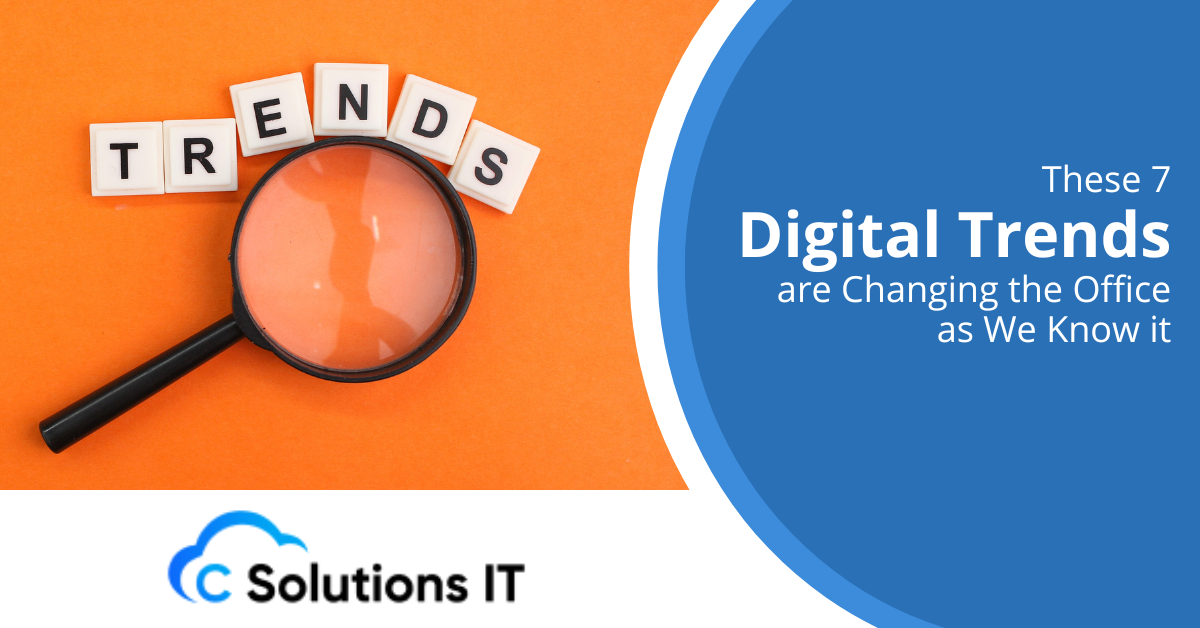These 7 Digital Trends are Changing the Office as We Know it

The workplace has undergone significant transformations in recent years, driven by rapid advancements in technology and changing workforce dynamics. In this era of digital innovation, traditional office setups are evolving to accommodate new ways of working.
From remote work to artificial intelligence, several digital trends are reshaping the modern office landscape. In this article, we will explore seven of these trends and their impact on the way we work and collaborate.
1. Remote Work Revolution
The digital age has ushered in a remote work revolution, altering the very definition of an office. The COVID-19 pandemic accelerated this trend, compelling organizations to adopt remote work policies.
Many have realized that remote work can be just as productive, if not more so, than the traditional in-office setup. As a result, companies are embracing hybrid work models, allowing employees to work from anywhere. Key points in this trend include:
- Flexibility: Employees have the freedom to choose their work environment, which has improved work-life balance.
- Technology: Collaborative tools and cloud-based solutions enable seamless remote work.
- Challenges: Managing remote teams, cybersecurity concerns, and maintaining a company culture are the key challenges.
2. Artificial Intelligence and Automation
Artificial Intelligence (AI) and automation have disrupted the way tasks are performed in the office. From chatbots handling customer queries to predictive analytics streamlining decision-making, AI is enhancing efficiency and productivity.
Here’s a closer look:
- AI-powered Chatbots: They offer instant customer support and reduce the workload on human agents.
- Predictive Analytics: Helps businesses make data-driven decisions for better outcomes.
- Workflow Automation: Repetitive tasks are automated, freeing up employees for more strategic work.
Machine Learning
Machine learning, a subset of AI, is making significant strides in the office environment. It allows systems to learn and improve from experience, making it a valuable tool in various sectors:
- Customer Service: Chatbots that continuously learn from interactions to provide better assistance.
- HR: Recruitment and onboarding processes are optimized through machine learning algorithms.
- Cybersecurity: Identifying and mitigating security threats in real-time.
3. The Rise of Virtual Reality (VR) and Augmented Reality (AR)
Virtual Reality (VR) and Augmented Reality (AR) are transforming the traditional office into a space where immersive experiences and enhanced communication play a vital role.
Key applications of these technologies include:
- Training and Development: VR is used for hands-on training, particularly in fields like healthcare and aviation.
- Collaboration: AR facilitates real-time collaboration, where team members can visualize data and interact with virtual objects.
- Virtual Meetings: Instead of traditional video conferences, VR meetings offer a more immersive and engaging experience.
4. Cybersecurity and Data Privacy
With the increasing digitization of office processes and remote work becoming the norm, the importance of cybersecurity and data privacy cannot be overstated. As digital assets and sensitive information are stored online, protecting them is paramount:
- Zero Trust Security: This approach focuses on verifying anyone trying to access company data, regardless of their location.
- Data Encryption: Encryption ensures that data remains confidential and secure during transmission.
- Employee Training: Raising awareness about cybersecurity risks and best practices among employees.
5. The Cloud Revolution
Cloud computing has revolutionized the way businesses store and access data. It provides scalability, accessibility, and cost savings.
Key aspects of the cloud trend include:
- Scalability: Companies can easily scale their IT infrastructure up or down based on their needs.
- Collaboration: Cloud-based tools and platforms facilitate collaboration among remote teams.
- Cost-Efficiency: Pay-as-you-go models reduce the need for large upfront investments.
Hybrid and Multi-Cloud
Many companies are adopting hybrid and multi-cloud strategies to optimize their IT infrastructure. This approach involves using a combination of private, public, and on-premises clouds for various workloads:
- Flexibility: Businesses can choose the best cloud provider for each specific application.
- Disaster Recovery: Data redundancy across multiple clouds enhances data recovery options.
- Cost Optimization: Multi-cloud strategies help companies control costs and avoid vendor lock-in.
6. Sustainable and Green Technologies
As environmental concerns take center stage, offices are embracing sustainable and green technologies to reduce their carbon footprint. This trend encompasses various initiatives, such as:
- Energy-Efficient Office Spaces: Utilizing smart lighting, HVAC systems, and energy-efficient appliances.
- Paperless Work Environments: Transitioning from paper-based documentation to digital alternatives.
- Renewable Energy Sources: Installing solar panels and using renewable energy to power office buildings.
7. The Internet of Things (IoT)
The Internet of Things (IoT) is connecting everyday devices to the internet, and this connectivity is transforming the modern office in several ways:
- Smart Offices: IoT devices like sensors and smart thermostats help optimize office spaces for comfort and energy efficiency.
- Asset Tracking: IoT enables organizations to track and manage their assets more effectively.
- Enhanced Employee Experience: IoT can improve the employee experience by personalizing the workplace environment.
Embrace These Digital Trends Today
These digital trends are not just changing the office as we know it; they are reshaping the very essence of work itself. Businesses that adapt to these trends and embrace digital transformation are better positioned to thrive in this evolving landscape.
To learn more about how C Solutions IT can help your organization leverage these trends to achieve success, please contact us. Our team is dedicated to providing tailored IT solutions that empower your business in the digital age.
